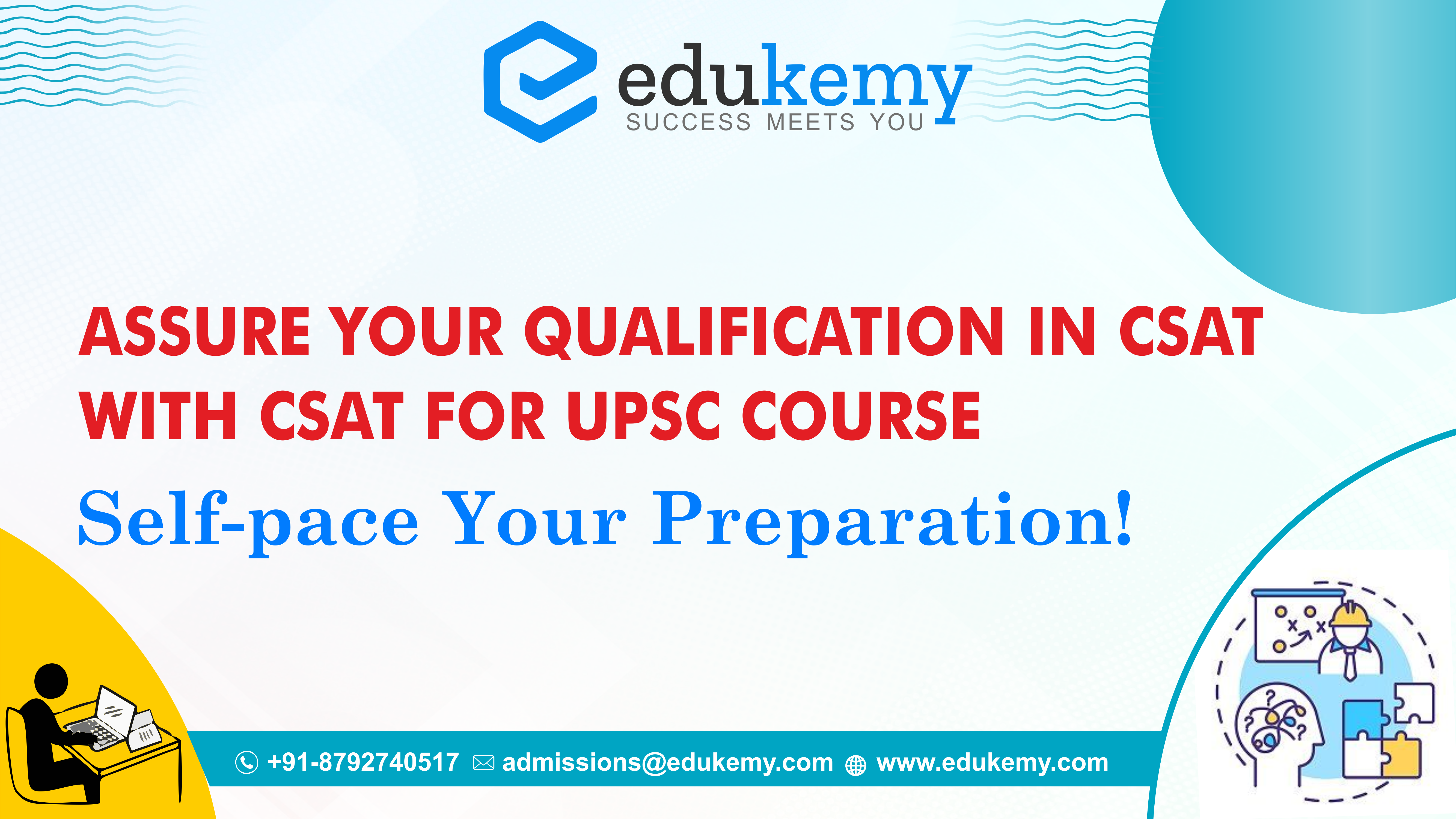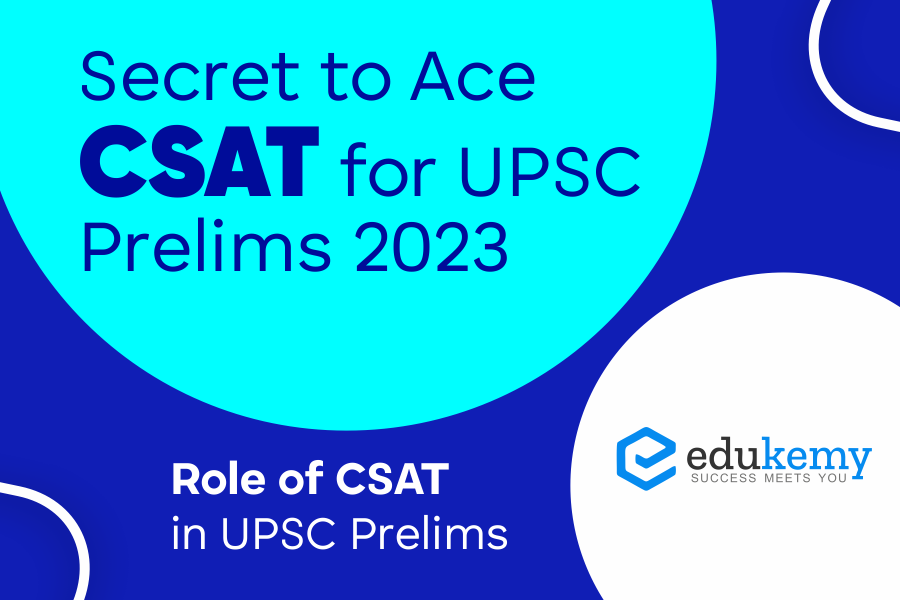
The key to excelling in the CSAT (Civil Services Aptitude Test) for UPSC Prelims 2023 lies in a strategic and well-rounded approach. Firstly, candidates should develop a solid understanding of the syllabus, focusing on quantitative aptitude, logical reasoning, comprehension, and data interpretation. Regular practice through solving previous year papers and mock tests is imperative to hone problem-solving skills and manage time effectively. Additionally, staying updated on current affairs is crucial for the comprehension and analytical portions of the exam. Developing a habit of reading newspapers, magazines, and online sources daily will contribute significantly to this aspect. Moreover, candidates should cultivate a disciplined study routine and allocate sufficient time to each section, ensuring comprehensive coverage. Techniques like elimination and smart guessing can be employed to maximize scores, especially when faced with challenging questions. Finally, maintaining a positive mindset, staying calm under pressure, and revising thoroughly before the exam are essential components of the secret recipe to ace the CSAT for UPSC Prelims 2023.
Role of CSAT in UPSC Prelims
Due to the qualifying nature of the CSAT, it is taken casually by many aspirants when it impacts the prelims cutoff. Many candidates believe that they can clear the paper by just attempting the comprehension questions, which is not the case. In this article, we will be going through ways to prepare for the CSAT and how to ace the exam.
Contents
- 1 CSAT exam pattern
- 2 What is the CSAT?
- 3 CSAT syllabus
- 4 Books for CSAT preparation
- 5 Preparation tips
- 6 Frequently Asked Questions (FAQs)
- 6.1 1. FAQ: What is the significance of CSAT in UPSC Prelims 2023, and how can I ace it?
- 6.2 2. FAQ: How can I effectively manage time during the CSAT exam?
- 6.3 3. FAQ: Is it necessary to have strong mathematical skills for CSAT, and how can I improve them?
- 6.4 4. FAQ: Are there specific reading strategies for the comprehension section of CSAT?
- 6.5 5. FAQ: How should I approach the decision-making section in CSAT?
- 7 In case you still have your doubts, contact us on 9811333901.
CSAT exam pattern
The Prelims CSAT paper consists of 80 objective-type questions, and the time allotted for the paper is 2 hours. Each question carries 2.5 marks in the CSAT paper making a total of 200 marks. There is a negative marking for incorrect answers. For every incorrect answer, 1/3rd of the total marks allotted to that question, i.e., 0.83 marks, are deducted. But if a question is left unattempted/unanswered, no marks will be deducted.
You will need to get 66 out of 200 marks to pass the CSAT.
What is the CSAT?
The CSAT is short for ‘Civil Services Aptitude Test’ or ‘General Studies II’, a qualifying paper for the UPSC Prelims. It was introduced in 2011 as part of the CSE to test the analytical skills, reasoning ability and aptitude of a candidate.

CSAT syllabus
The CSAT syllabus consists of:
1. Comprehension
2. Interpersonal skills including communication skills
3. Logical reasoning and analytical ability
4. Decision-making and problem-solving
5. General mental ability
6. Basic numerical ability (numbers and their relations, orders of magnitude, etc.- Class X level, and Data interpretation (charts, graphs, tables, data sufficiency, etc. – Class X level).
Books for CSAT preparation
CSAT preparation looks easy and simple at first glance but that is misleading. Given below are important books for CSAT preparation.
1. Analytical Reasoning by M. K. Pandey
2. The Mantra of CSAT Paper II by Gautam Puri
3. General Studies Paper-II for UPSC Preliminary Examination by Tata McGraw Hill
4. A Modern Approach to Verbal and Non-Verbal Reasoning by R.S. Aggarwal
5. Cracking the Civil Services Aptitude Test Paper-II by Arihant
These books are vital if you want to get good scores in the CSAT.
Preparation tips
1. Reading daily
Ensure you read a novel for 1 – 2 hours a day to increase your reading comprehension. You can substitute this with newspapers as well or weekly magazines.
2. Practice previous papers
To ensure you ace topics under the mental ability section; practice papers from previous years to understand how to solve questions revolving around time and distance, puzzles, and codes, etc.
3. Practice questions from test books
make sure to solve questions in test books to get a hang of how to solve mathematical and logical reasoning questions.
4. YouTube
Refer to YouTube videos to teach you and to practice for the CSAT. It is a free resource that will be especially useful when studying at home.
5. Formula notes
Make sure to make a crisp note of all the formulas you need for mathematics to refer to when studying and revising.

Frequently Asked Questions (FAQs)
1. FAQ: What is the significance of CSAT in UPSC Prelims 2023, and how can I ace it?
Answer: CSAT (Civil Services Aptitude Test) is a crucial component of UPSC Prelims. While it doesn’t count towards your final rank, it is a qualifying paper. To ace CSAT, focus on improving your quantitative aptitude, logical reasoning, and comprehension skills. Practice regularly with previous years’ question papers and adopt time-management strategies to enhance your performance.
2. FAQ: How can I effectively manage time during the CSAT exam?
Answer: Time management is key in CSAT. Allocate specific time to each section based on your strengths. Prioritize questions you can answer quickly, leaving more time for challenging ones. Practice with timed mock tests to improve your speed. Remember, managing time efficiently is crucial for maximizing your score.
3. FAQ: Is it necessary to have strong mathematical skills for CSAT, and how can I improve them?
Answer: While mathematical skills are essential, CSAT is designed to test basic aptitude rather than advanced mathematics. Focus on mastering fundamental concepts like percentages, ratios, and averages. Regular practice with mathematical problems from previous years’ papers and reference books will boost your confidence and proficiency.
4. FAQ: Are there specific reading strategies for the comprehension section of CSAT?
Answer: Yes, effective reading strategies can significantly enhance your performance in the comprehension section. Develop a habit of active reading, focus on understanding the main idea of the passage, and practice summarizing key points. Brush up on vocabulary and practice reading diverse topics to improve your comprehension skills.
5. FAQ: How should I approach the decision-making section in CSAT?
Answer: Decision-making in CSAT assesses your ability to analyze situations and make sound judgments. Practice ethical decision-making and cultivate a rational approach. Familiarize yourself with common decision-making scenarios by solving case studies. This will enhance your problem-solving skills and improve your performance in this section.
In case you still have your doubts, contact us on 9811333901.
For UPSC Prelims Resources, Click here
For Daily Updates and Study Material:
Join our Telegram Channel – Edukemy for IAS
- 1. Learn through Videos – here
- 2. Be Exam Ready by Practicing Daily MCQs – here
- 3. Daily Newsletter – Get all your Current Affairs Covered – here
- 4. Mains Answer Writing Practice – here


